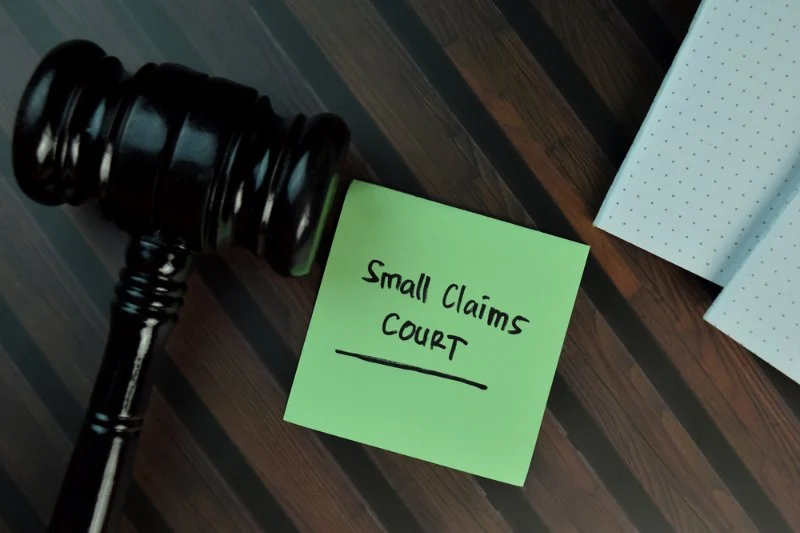
- 1. What is Small Claims Court?
- 2. Who Can Use Small Claims Court?
- 3. How to File a Claim in Small Claims Court
- 4. What to Expect During the Hearing
- 5. Tips for Winning Your Small Claims Case
- 6. After the Judgment: What Happens Next?
1. What is Small Claims Court?
Small claims court is a legal venue where individuals and businesses can resolve disputes involving relatively small amounts of money. Typically, small claims court handles cases where the claim amount does not exceed a set limit, which varies by state or jurisdiction. The process is designed to be faster and simpler than traditional court cases, providing an accessible platform for those who cannot afford expensive legal fees.
In small claims court, legal representation is often not required, making it an attractive option for those looking to resolve disputes efficiently. However, understanding the process and preparing adequately is crucial for success. Whether you're pursuing a claim or defending one, a basic understanding of the system will help you navigate the court process effectively.

Ponce Law Tennessee Car & Truck Accident Injury Attorneys
GoodlettsvilleDavidson CountyTennessee
400 Professional Park Dr, Goodlettsville, TN 37072, USA
2. Who Can Use Small Claims Court?
Anyone can use small claims court, but it’s important to determine whether your case qualifies. Small claims courts typically deal with cases involving money owed, property damage, contract disputes, or personal injury claims with low financial stakes. In general, the monetary limit for small claims court ranges from $2,500 to $25,000 depending on the jurisdiction.
If you are involved in a dispute that fits within these boundaries, small claims court might be a viable option for resolving your issue. However, some cases, such as divorce or complex contract disputes, might need to be addressed in a higher court. It’s essential to check with your local court to confirm whether your issue is eligible for small claims court.
3. How to File a Claim in Small Claims Court
The process of filing a claim in small claims court typically involves several steps:
3.1. Gather Your Documents
Before filing your claim, make sure you have all relevant documentation to support your case. This includes contracts, receipts, photographs, emails, or any other evidence that demonstrates the details of your dispute. The stronger your evidence, the better your chances of success in court.
3.2. File Your Claim
Once you’ve gathered your evidence, you’ll need to file a complaint with the small claims court in the jurisdiction where the defendant lives or where the dispute occurred. Typically, you’ll need to complete a simple form that details the nature of your claim and the amount of money you are seeking. There may be a filing fee, which varies depending on your jurisdiction.
3.3. Serve the Defendant
After filing your claim, you must legally notify the defendant by serving them with the court papers. This step is essential to ensure the defendant has an opportunity to respond. If the defendant is not properly notified, the court may not be able to proceed with your case.
4. What to Expect During the Hearing
The hearing in small claims court is designed to be less formal than traditional court proceedings. Typically, the judge will allow both parties to present their case, and the defendant will have an opportunity to defend themselves. Each side will be asked to present their evidence, and the judge may ask questions to clarify details.
It’s crucial to be well-prepared for the hearing. Bring all your documentation, be concise when explaining your case, and stay respectful throughout the proceedings. In many cases, the judge will issue a decision immediately after the hearing, or they may take time to deliberate and issue a written decision at a later date.
5. Tips for Winning Your Small Claims Case
Here are some practical tips to improve your chances of success:
5.1. Be Prepared
Ensure that you have all the necessary evidence and documents organized and ready for presentation in court. Being well-prepared shows the judge that you are serious and credible.
5.2. Keep It Simple
Present your case clearly and concisely. Stick to the key facts and avoid unnecessary details. The simpler and more straightforward your argument, the better your chances of winning.
5.3. Stay Professional
Even if you feel frustrated or angry, always remain professional in court. The judge will respect you more if you maintain a calm and respectful demeanor throughout the process.
6. After the Judgment: What Happens Next?
Once the judge has made a decision, they will issue a judgment. If you win, you may be awarded the amount you requested in your claim, but collecting that money can sometimes be a challenge. If the defendant does not voluntarily pay, you may need to take additional steps such as garnishing wages or placing a lien on property.
If you lose, you may have the option to appeal, although this process is often more complex and may involve higher courts. Either way, it’s essential to understand your options and what actions to take after the judgment to enforce the decision or resolve the dispute.
For more detailed assistance or to learn more about small claims court procedures, visit Barber Law Hub, where we provide resources and expert guidance to help you navigate the legal system successfully.








 Law Offices of Shannon K. McDonald3.0 (21 reviews)
Law Offices of Shannon K. McDonald3.0 (21 reviews) Brandon J. Broderick, Personal Injury Attorney at Law Elizabeth5.0 (104 reviews)
Brandon J. Broderick, Personal Injury Attorney at Law Elizabeth5.0 (104 reviews) Law Office Of Mary Katherine Brown4.0 (33 reviews)
Law Office Of Mary Katherine Brown4.0 (33 reviews) Mincey Fitzpatrick Ross, LLC3.0 (16 reviews)
Mincey Fitzpatrick Ross, LLC3.0 (16 reviews) Dalli & Marino LLP - Personal Injury & Nursing Home Abuse Attorneys0.0 (0 reviews)
Dalli & Marino LLP - Personal Injury & Nursing Home Abuse Attorneys0.0 (0 reviews) CourtLaw Injury Lawyers5.0 (3 reviews)
CourtLaw Injury Lawyers5.0 (3 reviews) How to Avoid Common Legal Mistakes When Buying a Home – Expert Advice
How to Avoid Common Legal Mistakes When Buying a Home – Expert Advice Law Made Simple: Understanding Child Custody Laws in Simple Terms
Law Made Simple: Understanding Child Custody Laws in Simple Terms How to Expunge a Criminal Record – A Complete Guide
How to Expunge a Criminal Record – A Complete Guide How to Choose the Right Lawyer for Your Case – Expert Legal Advice
How to Choose the Right Lawyer for Your Case – Expert Legal Advice Your Rights During a Police Stop – Expert Legal Advice for Citizens
Your Rights During a Police Stop – Expert Legal Advice for Citizens A Step-by-Step Guide to Writing a Will – Expert Legal Advice
A Step-by-Step Guide to Writing a Will – Expert Legal Advice